A new Lancet Public Health editorial highlights the wide-reaching impact of conditional cash transfers on health, equity, and economic resilience—especially in times of fiscal strain.
In its July 2025 issue, The Lancet Public Health spotlights the transformative role of conditional cash transfers (CCTs) in improving public health outcomes and reducing poverty. With more than 100 countries implementing these programmes over the last three decades, CCTs have become central to social protection strategies. They link financial support to essential health and education behaviours, proving instrumental in meeting global development goals.
The issue covers recent research on Brazil’s Bolsa Família Program, which provides monthly payments to families in extreme poverty in exchange for school attendance and vaccinations. Over two decades, the programme has prevented over 700,000 deaths and 8 million hospitalisations. Beyond improving health for recipients, CCTs generate positive spillover effects for entire communities and stimulate local economies, making them a smart long-term investment.
However, amid global economic uncertainty, some governments are cutting back. Brazil’s recent reduction in Bolsa Família’s budget could increase mortality and strain the health system, researchers warn. The editorial argues that CCTs are not just welfare measures—they’re strategic investments with measurable returns across health, equity, and the economy. Policymakers must consider innovative, equitable financing strategies to protect these gains and avoid short-sighted austerity.
Check out the full issue.


